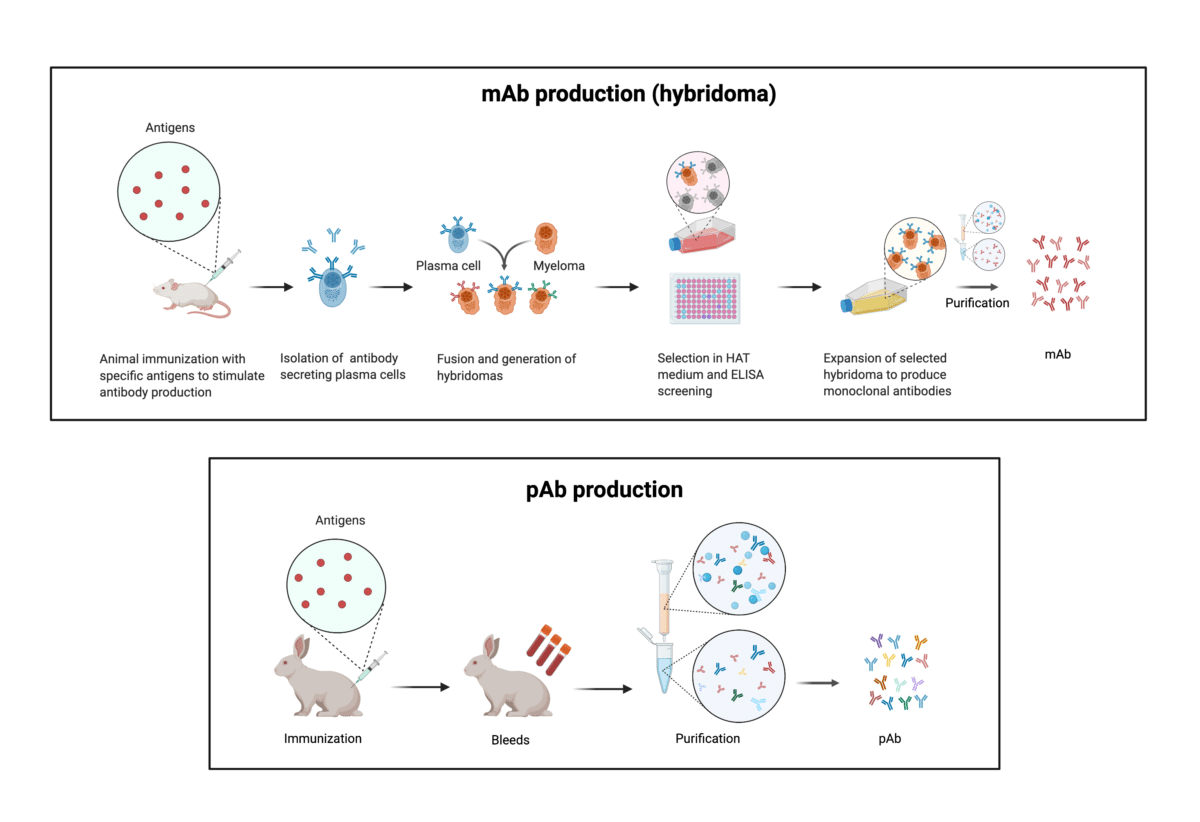Polyclonal Antibody Vs Monoclonal

The realm of immunology is vast and intricate, with various tools at its disposal to combat diseases. Among these, antibodies stand out as crucial molecules, capable of recognizing and binding to specific antigens. The diversity in antibody responses is categorized mainly into two types: polyclonal and monoclonal antibodies. Each type has its unique characteristics, applications, and advantages, reflecting the complexity and specificity of the immune system.
Introduction to Antibodies
Before diving into the differences between polyclonal and monoclonal antibodies, it’s essential to understand what antibodies are. Antibodies, also known as immunoglobulins, are glycoprotein molecules produced by B cells (a type of white blood cell) in response to the presence of foreign substances, known as antigens. These molecules are designed to bind to specific antigens, marking them for destruction or neutralizing their harmful effects.
Polyclonal Antibodies
Polyclonal antibodies are a mixture of different antibodies produced by various B cells in response to an antigen. Each antibody in the mixture recognizes a different epitope (the specific region on an antigen that is recognized by the immune system) on the same antigen. This diversity in recognition allows polyclonal antibodies to bind to multiple sites on an antigen, potentially leading to a more robust immune response.
Production of Polyclonal Antibodies
The production of polyclonal antibodies involves immunizing an animal (commonly rabbits, mice, or goats) with the antigen of interest. After several immunizations, the animal’s blood is harvested, and the serum, which contains a mixture of antibodies, is extracted. This serum can then be used as a source of polyclonal antibodies.
Advantages of Polyclonal Antibodies
- Rapid Production: Polyclonal antibodies can be produced relatively quickly, often within a few weeks.
- Broad Specificity: They can recognize multiple epitopes on an antigen, making them effective for capturing and detecting antigens in various contexts.
- Cost-Effective: The initial costs associated with generating polyclonal antibodies can be lower compared to monoclonal antibodies.
Disadvantages of Polyclonal Antibodies
- Limited Supply: The supply of polyclonal antibodies is limited by the availability of the immunized animal’s serum.
- Variable Quality and Specificity: Since polyclonal antibodies are a mixture, their specificity and efficacy can vary between batches.
- Potential for Cross-Reactivity: The broad specificity of polyclonal antibodies can sometimes lead to cross-reactivity with other antigens, reducing their usefulness in certain applications.
Monoclonal Antibodies
Monoclonal antibodies, on the other hand, are produced by a single clone of B cells and recognize a single epitope on an antigen. This uniformity in recognition and production ensures that monoclonal antibodies have high specificity and consistency, making them invaluable for diagnostic and therapeutic applications.
Production of Monoclonal Antibodies
The production of monoclonal antibodies involves a more intricate process. It starts with immunizing a mouse with the antigen of interest. B cells from the immunized mouse are then fused with myeloma cells (cancerous plasma cells) to create hybridomas. Each hybridoma is then screened for the production of the desired antibody. Once identified, the hybridoma can be cultured indefinitely to produce large quantities of the specific monoclonal antibody.
Advantages of Monoclonal Antibodies
- High Specificity: Monoclonal antibodies recognize a single epitope, reducing the chance of cross-reactivity.
- Consistency: Since they are produced by a single clone of B cells, monoclonal antibodies have consistent quality and specificity.
- Unlimited Supply: Hybridomas can be cultured indefinitely, providing a virtually unlimited supply of the same monoclonal antibody.
Disadvantages of Monoclonal Antibodies
- Time-Consuming and Expensive Production: The process of generating monoclonal antibodies is lengthy and costly.
- Mouse-Origin Concerns: Historically, many monoclonal antibodies were produced in mice, which could lead to immune reactions when used in humans. However, advancements in technology have allowed for the production of humanized or fully human monoclonal antibodies, mitigating this issue.
Comparison Summary
| Characteristics | Polyclonal Antibodies | Monoclonal Antibodies |
|---|---|---|
| Production | Animal serum | Hybridoma technology |
| Specificity | Recognize multiple epitopes | Recognize a single epitope |
| Supply | Limited | Unlimited |
| Consistency | Variable | Consistent |
| Cross-Reactivity | Higher risk | Lower risk |
| Production Time | Relatively quick | Time-consuming |
| Cost | Initially cost-effective | Expensive |

Applications and Future Directions
Both polyclonal and monoclonal antibodies have found extensive use in medical research, diagnostics, and therapy. Polyclonal antibodies are useful for applications where broad specificity is beneficial, such as in certain diagnostic assays. Monoclonal antibodies, due to their high specificity and consistency, have become pivotal in targeted therapies for diseases like cancer and rheumatoid arthritis.
The future of antibody technology is promising, with ongoing research focusing on improving the production, specificity, and humanization of monoclonal antibodies. The development of single-domain antibodies, bispecific antibodies, and antibody-drug conjugates represents the next generation of therapeutic antibodies, offering enhanced efficacy and reduced side effects.
Conclusion
In conclusion, the choice between polyclonal and monoclonal antibodies depends on the specific application, considering factors such as the required specificity, the need for consistency, and the available resources. Understanding the strengths and limitations of each type of antibody is crucial for harnessing their potential in advancing medical science and improving human health.
What is the primary difference between polyclonal and monoclonal antibodies?
+The primary difference lies in their specificity and production. Polyclonal antibodies are a mixture of antibodies that recognize multiple epitopes on an antigen, produced by different B cells. In contrast, monoclonal antibodies are produced by a single clone of B cells and recognize a single epitope, ensuring high specificity and consistency.
Which type of antibody is more commonly used in therapeutic applications?
+Monoclonal antibodies are more commonly used in therapeutic applications due to their high specificity, consistency, and ability to target specific cells or molecules, reducing side effects and improving efficacy.
